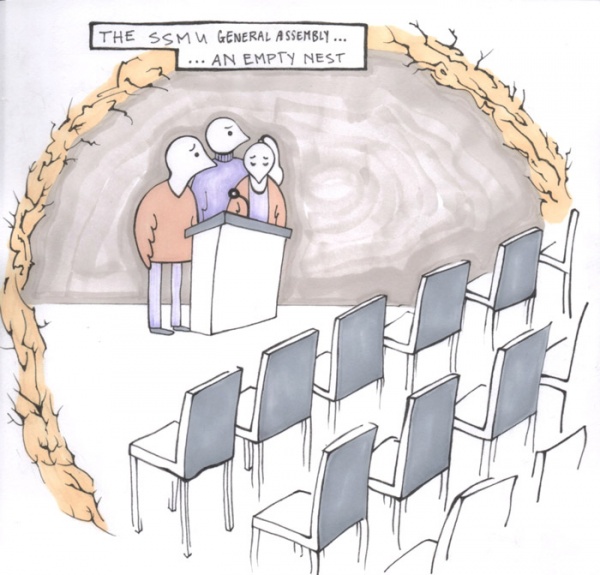The Students’ Society of McGill University (SSMU) held its annual Winter General Assembly (GA) on Feb. 22, hosting roughly 900 students within the SSMU Building for a six-hour debate over multiple different issues. The GA was a dramatically different showing than the Fall 2015 GA, which, due to a lack of controversial agenda items, failed to reach quorum. This prompted SSMU President Kareem Ibrahim to make a simple and effective argument: Dismantle the bi-annual GA system, and replace it with one annual general meeting.
Over the past few years, the GA has faced wavering student interest due to lack of consistency in the controversy of the motions and, in some cases, poor promotion on behalf of SSMU. The variation in student attendance just in the past three years is striking: The Fall 2013 GA reached a maximum attendance of 50 students, while the Winter 2014 GA maintained quorum through all but one motion. The next two GAs saw an attendance of 739 and 550 students respectively, far surpassing the number of students required to meet quorum due to the contentious nature of the motions brought forward, both regarding the situation in Palestine. The inability of this meeting to fulfill its democratic purpose unless emotional and personal controversies are brought forward illustrates its ineffective nature at actually addressing needs relevant to students’ day-to-day lives.
SSMU Vice-President (VP) Finance & Operations Zacheriah Houston noted how, in addition to inconsistent attendance rates, figuring out where to host the GA every semester presents its own challenges.
“Last year [the SSMU executives] tried [to hold the GA in SSMU] and it was horrible, so they moved it to Leacock,” Houston said. “In my opinion, the one we just did was better than the previous two [….] logistically it was much better [….] In terms of the GA as a whole though, just the way that it works and the fact that we can’t get a reasonable turn-out unless we put a Palestine-Israel motion on the agenda, there’s a lot of improvement to be had there.”
Ibrahim echoed Houston’s comments, adding that he isn’t the first President to wonder about the usefulness of the GA and its failure to engage students unless a divisive issue is present.
“There’s been lots of discussion regarding the abolition of the [GA] in past years,” Ibrahim said. “I think that’s largely due to the size of the student body and how they can’t fit in this building. According to the [SSMU] porters, who have been here for 30 years, [the Feb. 22] GA was the biggest that they’ve seen [… but] the issue of BDS has been on this campus for decades.”
Ibrahim’s comments highlight another key issue with the current form of the GA: The SSMU Building is only equipped to fit around 1,000 students, nowhere near the size of the student body represented by SSMU. Were there to be a sudden and extreme pique in interest, SSMU, who is mandated to allow all students to vote, would be unable to provide space for the entire student body. As multiple students would be unable to voice their opinions on the issues at hand, the system is potentially undemocratic.
The structure of the GA has been flawed for a long time, prompting SSMU to host a forum in 2011 to discuss how to change the GA in order to make it more appealing to students. The same year, former SSMU President Zach Newburgh put forth a referendum question that would abolish the GA and instead replace it with an annual general meeting where issues would be debated but not voted upon. The issues debated would be voted on via online ratification, which was instituted earlier that same year. That debate took place a year after the McGill Tribune’s editorial board also called for an outright abolition of the GA, claiming that it had “become more damaging than productive, and [failed] to serve its purpose.” Reforms, such as mandating all motions passed in the GA have to pass online ratification, improving the webcasting of the GA, and introducing workshops to explain how the GA works, are, however, meaningless when it comes to substantive reform of the GA for an extended period of time.
Student consultation is a first necessary step to reforming the GA, but the fact is that feedback will likely be limited and meaningless if it is gathered during a time when no controversial motions are brought up, and students memories of past GA failings are dim. SSMU should proceed with its plans of restricting the institution of a GA if no motions are brought forth as a first step; however, the ultimate goal should involve introducing an annual general meeting with a dramatically decreased quorum in order to pass the necessary bureaucratic motions, and leave it up to students to call for a GA if they feel it’s necessary, similar to the way Special GAs can be instituted today. The result of this could be that student apathy continues, and GAs as we know them cease to exist; however, if interest groups find that they are not willing to put in the work necessary to call forth a GA, then the fault is theirs, and SSMU no longer has to waste its time on motions that lack student interest.










